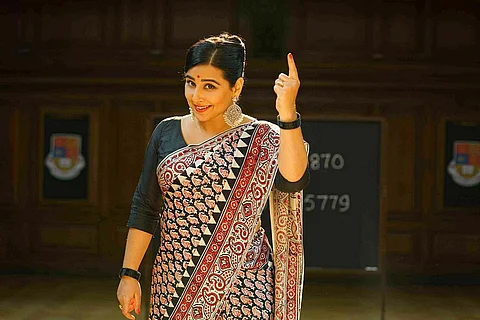

At some point in our lives, many of us have decided that we are never going to turn into our parents, that we will do things differently. But growing up, a lot of their actions can start to make sense. We may break some cycles, but we often end up becoming more like our parents in others. It’s a strange pattern; one that repeats more often than not, and which perhaps prompts parents to tell their children – you will know what it’s like when you have children of your own.
Shakuntala Devi, the late mathematician and Guinness record holder, was known as the “human computer” world-over for her ability to solve complex arithmetic in seconds. You will find a lot written and said about her for her mathematical talents and even other skills like astrology. But the film Shakuntala Devi does a brilliant job of humanising the genius through her relationship with her daughter Anupama, and bringing to life the reality of the parent-child cycle.
Releasing on Amazon Prime Video on July 31, Anu Menon’s Shakuntala Devi, starring Vidya Balan, is a biographical drama that explores the rise of the math genius. But it also gives us an insight into what lay beyond the mind-boggling calculations she put on display, and the woman who wanted to have it all.
Vidya Balan does a fantastic job of portraying Shakuntala as a woman with a larger than life personality, a wicked sense of humour, and who dared to want more than most, without a care that she was a woman. At no point does it feel like Vidya is trying too hard to be a woman who is ahead of her times as Shakuntala was; because she just is that way. Whether it is moments where she just states that she never understood the differentiations made for men and women, or when she stands completely unperturbed as the centre of attraction in rooms full of men, or when she questions the need for men to have women need them to feel validated – it is all seamlessly woven into the character.
It is also commendable that Vidya has managed to pick up Shakuntala Devi’s mannerisms and attitude for the character, without making it seem forced. For instance, the real-life Shakuntala’s interviews and demonstrations show that she would often ask the hosts “am I correct?” after she answered their math problems in a manner that exuded cheekiness and confidence, like she knew she could never be wrong. Vidya does the same in the film. She is an amazing but flawed person – just like any other – and it is her unabashed ownership of her desires and aspirations, and the struggles that come with it, that make Shakuntala Devi’s character so layered and a treat to watch.
A significant part of the film is dedicated to Anupama (played by Sanya Malhotra) and her relationship with Shakuntala, which is far from a rosy mother-daughter equation. But it is here that the film delivers some of its most heartfelt moments, especially in the second half. Sanya is convincing as Anupama, the girl who wants nothing more than a ‘normal’ life and a ‘normal’ mother while her friends envy her for being a genius’s daughter who gets to see the world. And then, impactful as the woman who wants to be nothing like her mother, but clearly carries her conviction and cannot escape the shadow of her fame.
It is appreciable that at no point have writers Anu Menon and Nayanika Mahtani slipped and made it feel as though we lose Shakuntala and begin seeing only a pining mother, which forms the heart of the tussle between the mother-daughter duo. Women are eulogised the most in the role of mothers, but only if they fit a narrow, and frankly unrealistic mould of motherhood. Shakuntala Devi is not only refreshing because it shows a woman who was unconventional, but also because it drives home the fact that women don’t stop being themselves when they become mothers.
In an interview to TNM, Nayanika called Shakuntala a “feminist without fanfare”. Similarly, the film ends up being feminist without ever preaching or setting out to be so overtly. It is unexpectedly funny with plenty of laugh out loud moments, thanks to Vidya’s effortless wit and sense of humour as Shakuntala, and also quite moving in its portrayal of relationships, and the intergenerational trauma that occurs as a result of the emotional baggage from our past. But mostly so because it peels through the exterior of a 'genius' and shows us a woman with all the strength and glory of her brilliance, her gregarious personality, as well as her pettiness and imperfections.
It also holds up a mirror to society; how insidious gender roles are, and how these can subtly but systematically hold back women from achieving their potential. And above all, what is the price that a woman who refuses to be held back pays, and the rewards she reaps when she dares to break the rules.
Disclaimer: This review was not paid for or commissioned by anyone associated with the series/film. TNM Editorial is independent of any business relationship the organisation may have with producers or any other members of its cast or crew.